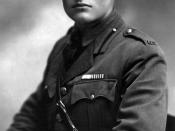This novel shows the existentialist way of thinking in the way that each person's life in the war was unique and the existence of that individual is unexplainable. Each move and each act is that person's responsibility, which may lead to something else, sometimes the difference between life and death. There is no God to watch over man, to dictate morality, or to reassure justice. Instead, the universe is indifferent and hostile to a soldier's life. In the book, this indifference is portrayed best by the war, which is an ultimately hostile and deadly struggle of man against man. There are no winners in a war, and there is no reasoning behind the lives that are taken.
Hemingway's novel is about love and war. This story shows the real side of the war that isn't a story about heroes and happy endings, or coming out happier than when you went in with pride and justice.
Hemingway shows that war wasn't always the way it was portrayed, it wasn't a good thing like many of the men who joined thought it would be. Instead it was going out on a field and leaving your life up to chance. No one knew what would happen next, you went out not knowing if you were going to live or die, and if you lived, you would come out wondering why you didn't die, and why someone else didn't live. It was hard to think straight when they would be thinking of all of these things. Lieutenant Henry, the main character, was an ambulance driver for the Italian military, he was only getting food for his men when an explosion injured his leg and other parts of his body and killed the man he had come with. The explosion put him in...


